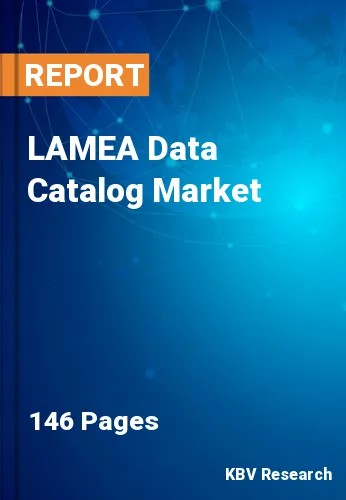The Latin America, Middle East and Africa Data Catalog Market would witness market growth of 26.2% CAGR during the forecast period (2022-2028).
Utilizing a data catalog has various advantages. Analysts can access detailed descriptions of data, as well as input from other data users, to get a greater appreciation for the significance of data to the company's activities. In addition, a data catalog creates an optimal division of labor between users and IT. As a consequence, data citizens can access data faster, and IT professionals can get more time to activities of the utmost importance. With more assurance, analysts operate with data that is legal to utilize for its purpose intended and conforms to data privacy rules.
In addition, they may scan metadata and annotations quickly for empty spaces or incorrect values that could influence the analysis. The descriptions of assets are the basis of a business data catalog, with robust and user-friendly search capabilities allowing any user to identify and understand any data asset. Multiple source platforms can also result in inconsistent exploitation of data resources or interpretation of their meaning. Developing a data catalog can prevent inconsistencies by consolidating all data regarding data assets on a single platform.
Automating the development and maintenance of a data catalog eliminates the need for administrative help. Selecting a data asset to utilize for analytics or publishing is not difficult because most organizations are flooded with data. However, selecting the right data assets for the task at hand can be challenging. In addition, the incorporation of usage patterns and user reviews and ratings in good data catalogs facilitates decision-making. When collaboration features are integrated into a data catalog, users are able to interact with one another regarding the data assets represented in catalog entries, which consequently, centralizes and archives this communication.
The goal of the project is to develop the utilization of data science and big data to enhance the creation of official statistics. Therefore, it seeks to build ties and foster cooperation between producers of official figures in the region, backed by the interchange of experiences and information, promoting more interaction and integration among regional producers and users, and capitalizing on created knowledge. This would enhance the capabilities of organizations in combining and handling data with the aid of tools like data catalogs. Therefore, the data catalog market has promising growth possibilities in the LAMEA region.
The Brazil market dominated the LAMEA Data Catalog Market by Country in 2021; thereby, achieving a market value of $47.3 million by 2028. The Argentina market is showcasing a CAGR of 26.9% during (2022 - 2028). Additionally, The UAE market would register a CAGR of 25.9% during (2022 - 2028).
Based on Metadata Type, the market is segmented into Technical Metadata and Business Metadata. Based on Vertical, the market is segmented into BFSI, IT & Telecom, Manufacturing, Retail & eCommerce, Government & Defense, Healthcare & Life Sciences, Transportation & Logistics, Media & Entertainment, and Others. Based on Component, the market is segmented into Solution and Services. Based on Deployment, the market is segmented into On-premise and Cloud. Based on Organization Size, the market is segmented into Large Enterprises and Small & Medium Enterprises. Based on Data Consumer, the market is segmented into Business Intelligence Tools, Mobile & Web Applications, Enterprise Applications. Based on countries, the market is segmented into Brazil, Argentina, UAE, Saudi Arabia, South Africa, Nigeria, and Rest of LAMEA.
Free Valuable Insights: The Global Data Catalog Market is Predict to reach $2.1 Billion by 2028, at a CAGR of 19.6%
The market research report covers the analysis of key stake holders of the market. Key companies profiled in the report include IBM Corporation, Microsoft Corporation, TIBCO Software, Inc., Collibra, Inc., Oracle Corporation, Google LLC, Informatica, LLC, Cloudera, Inc., Alteryx, Inc. and Alation, Inc.
By Metadata Type
By Vertical
By Component
By Deployment
By Organization Size
By Data Consumer
By Country
Our team of dedicated experts can provide you with attractive expansion opportunities for your business.

